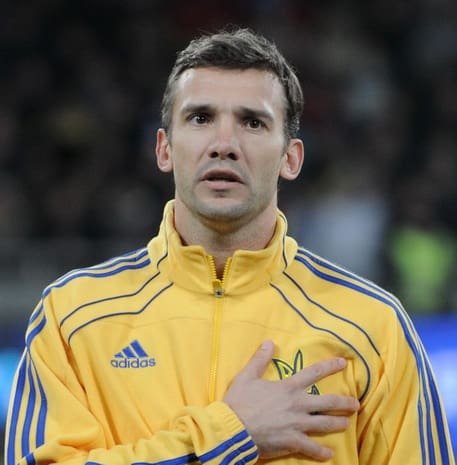The Rise and Fall of Andriy Shevchenko
In this episode we take on Andriy Shevchenko who played for Ac Milan and Dinamo Kiev as well as Chelsea for most of his career,

Andriy Shevchenko is more than just a football legend—he is a symbol of Ukrainian pride, resilience, and excellence on the global stage. Born on September 29, 1976, in the small village of Dvirkivshchyna in the Kyiv region of the Ukrainian SSR, Shevchenko’s rise to international fame is a remarkable story of talent, determination, and national identity.
Shevchenko’s football journey began in a country transitioning from the Soviet Union to an independent Ukraine. As a child, he survived the Chernobyl disaster’s aftermath, which forced his family to evacuate temporarily. Despite the challenges, his football talent was evident from a young age. He was accepted into the Dynamo Kyiv youth academy, one of the most prestigious football development programs in Eastern Europe.
He made his debut for Dynamo Kyiv’s senior team in 1994 and quickly became a star. By the late 1990s, Shevchenko was an essential part of the club’s dominant run in Ukrainian football, helping them to multiple league titles and strong performances in the UEFA Champions League. His hat-trick against FC Barcelona at the Camp Nou in 1997 remains one of his most iconic early achievements, putting Ukrainian football back in the global spotlight.
In 1999, Shevchenko made a high-profile move to AC Milan in Italy’s Serie A, one of Europe’s most competitive leagues. At Milan, he quickly became one of the world’s top strikers. His combination of speed, precision, and intelligence made him a nightmare for defenders.
During his time at Milan, Shevchenko scored over 170 goals in all competitions, won the Serie A title in 2004, and achieved the pinnacle of European club football by winning the UEFA Champions League in 2003. That same year, he scored the decisive penalty in the final against Juventus. His outstanding performances earned him the prestigious Ballon d’Or in 2004, making him only the third Ukrainian to win the award after legendary Soviet-Ukrainian striker Oleg Blokhin and Igor Belanov.
Shevchenko’s success at AC Milan made him a household name across Europe and an ambassador for Ukrainian football at a time when few post-Soviet athletes had reached such heights in Western Europe.
In 2006, Shevchenko joined Chelsea FC in the English Premier League, then managed by José Mourinho. The move, worth around £30 million, was one of the most talked-about transfers of the year. While his time at Chelsea was hampered by injuries and inconsistent form, he remained a high-profile figure in one of the world’s most competitive leagues and contributed to the team’s domestic success, including an FA Cup win.
He briefly returned to Milan on loan before rejoining Dynamo Kyiv in 2009, where he ended his playing career. His final years at Dynamo symbolized a return to his roots and a desire to give back to Ukrainian football.
Shevchenko’s international career was equally distinguished. He earned over 100 caps for the Ukrainian national team and scored 48 goals, becoming the country's all-time leading scorer. He captained Ukraine during their historic debut at the 2006 FIFA World Cup, leading them to the quarterfinals—a remarkable achievement for a nation competing on football’s biggest stage for the first time.
His emotional two-goal performance against Sweden at Euro 2012, hosted in part by Ukraine, remains a defining moment in the country’s sports history. Shevchenko retired from international football shortly after the tournament, transitioning from player to mentor.
In 2016, Shevchenko was appointed head coach of the Ukrainian national team. His tenure brought a fresh vision and a modern, possession-based style of play. Under his leadership, Ukraine qualified for UEFA Euro 2020 and made it to the quarterfinals, matching their best-ever performance at a major tournament.
His tactical intelligence and calm demeanor on the sidelines earned respect both at home and abroad. Shevchenko became a unifying figure, representing a new generation of leadership committed to developing Ukraine’s sporting identity on the European stage.
Beyond football, Shevchenko has become a respected cultural and public figure. Fluent in Ukrainian, Russian, English, and Italian, he has used his platform to promote Ukraine globally. He has supported humanitarian causes, especially during times of national crisis, including fundraising for medical aid and displaced families following Russia’s 2022 invasion of Ukraine.
In 2012, he briefly entered Ukrainian politics, running with the Ukraine – Forward! party, though he later shifted focus away from politics to concentrate on charity and football development. He continues to be involved in philanthropic projects, including youth sports programs and initiatives to promote Ukraine’s image internationally.
Andriy Shevchenko’s legacy is firmly cemented in both Ukrainian and global football history. His story is one of perseverance, national pride, and excellence. From the dusty fields of Dvirkivshchyna to the grand stages of Milan, London, and World Cup arenas, Shevchenko has shown that Ukrainian talent can shine anywhere.
For Ukrainian fans and international observers alike, Shevchenko is more than an athlete—he is a national icon. As Ukraine continues to assert its identity on the global stage, figures like Shevchenko remind the world of the country’s resilience, talent, and cultural richness.
Whether as a footballer, coach, or ambassador, Andriy Shevchenko remains a beacon of hope and pride for Ukraine—and an enduring legend in the world of sports.
In this episode we take on Andriy Shevchenko who played for Ac Milan and Dinamo Kiev as well as Chelsea for most of his career,
The Ukrainian treated top-tier European football like a TV talent show The tourist-trap street market is the easiest way for a visiting fan to delve